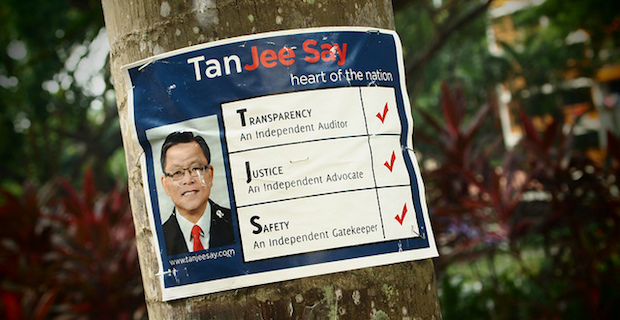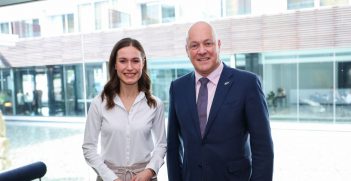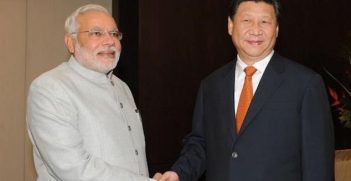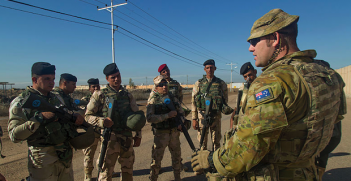Singapore's Elected Presidency Under Fire

Singapore’s election rules, hitherto used to ensure the ongoing rule of the People’s Action Party, are facing criticism from both within and without the government. The controversy surrouding recent reforms to racial criteria for presidential election candidates may undermine the authority of the winner of the September 2017 election.
Singapore’s People’s Action Party (PAP) has been a trailblazer among regimes harnessing electoral institutions and other forms of popular political participation to entrench authoritarian rule. The ruling party’s initiatives have generally worked to limit challenges to PAP interests and ideologies. However, they have not been entirely risk-free for the ruling party, and there is mounting contention over recent reforms affecting who can compete in this year’s presidential election.
The unfolding controversy is as much a product of challenges to government control from inside the PAP as from outside it—not something anticipated when the elected presidency was created. By the 1980s, PAP leaders understood that successful capitalist development in the city-state brought social transformations and uneven market outcomes that required a political response. A range of creative formal and informal political institutions followed, including nominated members of parliament and public policy feedback mechanisms.
In 1991, the office of the president also became an elected rather than appointed position. This was accompanied by enhanced powers to veto key public service appointments and government decisions about the spending of Singapore’s accumulated reserves. These powers offered political insurance for the PAP against an unlikely change of government that might, among other things, embark on ambitious social redistribution policies supported by these reserves.
Officially, these reserves are described as currently “well over US$100 billion” (AU$133 billion), but the Sovereign Wealth Fund Institute estimates their value at closer to US$250 billion.
For such important new powers, the PAP concluded that the authority of the president needed to be shored up through election. Yet stringent eligibility criteria appeared to all but rule out candidates from beyond the political and economic establishment.
Despite this, some interesting candidates emerged over time to challenge PAP-endorsed candidates and they attracted significant public support. As they explicitly or implicitly engaged in policy and philosophical reflections, the PAP feared an incremental politicisation of the post in ways it never intended.
PAP concerns were brought into sharpest relief during the most recent presidential election of 2011. The government-endorsed candidate, former Deputy Prime Minister, Tony Tan, won by a mere 0.34 per cent of the vote. His closest rival, former PAP backbencher, Tan Cheng Bock, derived his appeal precisely because he was not seen as part of the PAP inner circle but a grassroots politician with strong community links. This was a shot across the bow at the meritocracy of the contemporary PAP.
No less worrying, former civil servant Tan Jay See also attracted 25 per cent of the vote. He was a candidate in the 2011 general election for the opposition Singapore Democratic Party.
Against this background and with the next presidential election set for September this year, Prime Minister Lee Hsien Loong last year appointed a Constitutional Commission to review the elected presidency. Resulting reforms passed in parliament in late 2016, two of which are especially significant.
First, qualifying criteria for private sector candidates were bolstered so that only leading executives of a company with at least S$500 million (AU$476 million) in shareholders’ equity are eligible. Neither Tan Cheng Bock nor Tan Jay See could have contested the 2011 election under these rules. Second, to ensure minority ethnic representation in the office, where a candidate from a particular racial group has not been elected over five consecutive terms, a presidential election will be reserved for candidates from that group.
However, the passing of these reforms has not stopped criticism inside or outside parliament and the changes almost guarantee that the upcoming presidential election will be one of the most controversial.
Singapore Democratic Party’s Sylvia Lim took renewed aim in February at specific provisions in the Presidential Election Bill meant to entrench changes passed last year under the Constitution Amendment Bill. The former introduced a new section and related schedule for determining an ethnically reserved election.
Under this Schedule, President Wee Kim Wee is counted as the first of five non-Malays since the passing of the constitutional change introducing elected presidents. This is despite the fact that it was his successor, Ong Teng Cheong, who was the first to contest and win a presidential election. Prime Minister Lee told parliament that this interpretation reflected advice from the attorney-general’s chambers.
Lim’s request last November for the government to publish the attorney-general’s advice on the issue received a testy response from Deputy Prime Minister Teo Chee Hean. Teo questioned whether Lim was alleging the prime minister had been untruthful.
By February, though, Lim returned to Parliament buoyed by the extent of public questioning about the schedule to ask: “Is it because if Ong was the first to be counted, we would have to go through this year’s election as an open election, and risk a contest by Chinese or Indian candidates who may not be to the government’s liking?”
Then on 31 March Tan Cheng Bock directly entered the fray, declaring: “In all my years in parliament, we have always referred to Mr Ong Teng Cheong as the first elected president.” He called for the attorney-general’s recommendation on how to interpret the start of the elected presidency to be reviewed by the courts.
Tan Cheng Bock, who had announced his intention to contest the 2017 election as far back as March 2016, has also declared his suspicions. “I am concerned that the changes were introduced to prevent my candidacy,” he has said.
Meanwhile, speculation has begun about which ethnic Malay the PAP has in mind as its preferred candidate. Speaker of the House Halimah Yacob is a recurring name among the rumours. Yet whoever ultimately wins the election, their political authority could be diminished by the continuing controversy over how particular candidates and ethnic groups were rendered ineligible.
Ironically, this friction is occurring at a point in Singapore’s political economy when the PAP government has begun dipping more into Singapore’s reserves to support greater social spending, including through socially redistributive programmes. Indeed, the PAP’s increased commitments to such spending played a significant part in its considerable electoral support at the 2015 general election.
Garry Rodan is director of the Asia Research Centre and professor of politics and international studies at Murdoch University.
This article is published under a Creative Commons Licence and may be republished with attribution.





